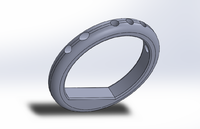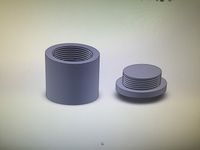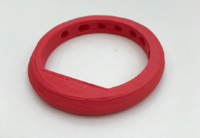Difference between revisions of "MedLit"
(→Budget) |
(→Budget) |
||
| Line 69: | Line 69: | ||
*microLED lights (3): Already have | *microLED lights (3): Already have | ||
*3D Printer TPU Filament: Already have | *3D Printer TPU Filament: Already have | ||
| − | Total | + | Total: $31.16 |
Cost per individual bracelet: $3.83 | Cost per individual bracelet: $3.83 | ||
Revision as of 02:22, 19 April 2018
Contents
Project Overview
Description
This project will create a way for users to always remember to take time-sensitive medication as well as have that medication readily available. A bracelet that holds a weekly supply of medication will alert the wearer at a certain time each day to take said medication. The problem we are tackling with this device is the issue with certain time sensitive medication, particularly birth control. In the case of birth control, perfect use (taken at same time each day) leads to more than 99% effective birth control, whereas imperfect use is only about 92% effective. This device will help the wearer to reach "perfect use" of their medication.
Group Members
- Lauren Bhambri
- Moira Mulholland
- Anton Salem
- John Fordice (TA)
Objectives
A successful project would include:
- 1. A Wearable bracelet (bangle) that slips on
- wide enough to fit a hand through while being tight enough to stay on
- printed using the 3D printer
- 2. A minimum of 7 compartments that fit most birth control pills
- compartments are accessed through screw on caps
- 3. LED reminder every 24 hours
- LED light goes off at the same time each day, reminding wearer to take medication
- able to turn off light when medication is taken
- 4.LED light indicating power supply of bracelet
- lights up red when battery is low
- Reach Goals:
- motor to vibrate bracelet when timer for medication goes off
- create water resistant bracelet
Challenges
Challenges we foresee for this project include:
Software
- Finding a microprocessor that is the right balance between small, workable, and inexpensive
- Programming the microprocessor and understanding the program needed
- programming a 24 hour timer
Mechanics
- Creating a bracelet design that will efficiently fit all pieces
- 3D printing the bracelet so that we may insert our electronics in it
- 3D printing with two different materials, urethane for the majority of the bracelet and PLA for the cases holding the pills
- Finding a way to check battery level without using too much charge in the process
- designing and printing screw on caps for each pill compartment
Electronics
- connecting battery, ATTiny, and LED lights properly with wires
Design Milestones and Solutions
Some preliminary work we accomplished includes working with the AtTiny to light an LED, using solid works to design a pill capsule, and designing and printing a preliminary bracelet.
Our greatest design issue thus far has been designing a pill case. Printing threading for a screw on cap is difficult due to the sizing of the thread. Our current solution is to print cases similar to a rubber stopper that will be held into the holes of the bracelet via friction.
Budget
- Microprocessor (atTiny): $2.84
- Tiny AVR Programmer: $19.95
- 312 Battery (24 count): $8.37
- microLED lights (3): Already have
- 3D Printer TPU Filament: Already have
Total: $31.16
Cost per individual bracelet: $3.83



